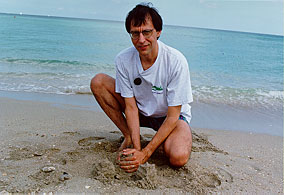
|
J
O H N
K
E S S E L : No More Dr. Nice (excerpted from Locus Magazine, June 1997) | |||
 Photo by Beth Gwinn other interview excerpts |
John Kessel became well-known in 1982 with the novella "Another Orphan", a fantasy based on Melville's Moby Dick, which received a Nebula Award in 1983. He later won a 1992 Sturgeon Memorial Award for "Buffalo" (also winner of a Locus Award that year for Short Story). He co-wrote the novel Freedom Beach with James Patrick Kelly, then published the solo novels Good News from Outer Space (1989) and this year's Corrupting Dr. Nice. His short story collections are Meetings in Infinity (1992) and The Pure Product (forthcoming from Tor, December 1997). "Some people have said, 'You're not really a science fiction writer.' I think I am. I have always been committed to the field since I was a kid, and I don't think I ever will end up anylace else. I used to do more contemporary fantasy, no elves or gnomes, but mysterious happenings in the present day with no explanation. Now, I want to write real science fiction. So in a way, my writing has gotten more traditional -- more regular plots, real science fiction -- but I still think I'm messing around the edges of things!..." "For Corrupting Dr. Nice, I wanted to make the time travel as rigorous as I possibly could: have a framework, set it up, stick with it, and think about all the implications as much as I could... I read Paul Nahin's book Time Machines. It's full of real physics, and that was very interesting to me. (My undergraduate degree is in Physics.) ...I think I've invented the term 'moment universe,' and I think it's a very useful one." "It was a real challenge, doing a comedy in Corrupting Dr. Nice. I like satire, but I've never tried to write straight comedy, at least at that kind of length... It was interesting to try to combine comedy with what I thought was a serious science fiction book. The problem with comedy is, you've got to have these lovers, this happy ending, to have everything work out all right in the end, and satire usually has such a cynical view of the world that it's hard to reconcile those things...."
"...I had two years reviewing for F&SF...As a reviewer, you have to understand why a book does or doesn't work for you. In that way, it might be good for a writer to do a little patch of reviewing, to get conversant with what's going on. There's a tendency for writers to have read a ton of stuff before they were 25, and then, once they get into their careers, stop reading. The field has gotten so wide and so diverse....I'm a little worried now that there are writers out there that I could really benefit from reading.... The other thing I did like about reviewing is, it gave me the opportunity to tell what I liked about things that were good. As a teacher, I want to go out and proselytize, to say, 'Look at this, this is great -- and this is why it's great.'" |
||
| © 1997 by Locus Publications. All rights reserved. |